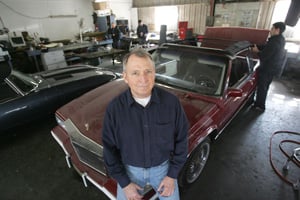When Tom Benson, owner of an auto upholstery business, looks at the tax hike proposals that may go to voters next year, he’s seeing fewer sales of leather seats and ragtops.
Benson is president and majority owner of Bud’s Beach Cities, which sells and installs auto upholstery and convertible tops. He is most concerned about a tax proposal that would extend the sales tax to services.
“This would affect half my business,” Benson said. “I charge sales tax on parts, but there’s no sales tax on labor. If this passes, I would have to charge sales tax on labor.”
Benson said that costs to customers would go up at all auto body and aftermarket stores, so people would find other ways to install the parts, either taking their cars out of state or paying someone under the table for the work.
The Signal Hill store owner is also anxious about a split-roll tax measure that would force more frequent reassessment of commercial properties. He said that would make commercial property more expensive, pushing up lease rates and forcing some small businesses to close.
“You just go along Cherry Avenue near my business and you see at least twice as many for-lease signs up as you did three or four years ago,” he said. “This measure would only make it worse.”
Benson is hardly alone in his opposition to the split-roll tax measure, which, along with other proposals, is aimed for November’s ballot. In a survey of five local business groups surveyed by the Business Journal on the proposal, all five either opposed the split-roll measure outright or said they would likely oppose it. (See chart.)
“We are aggressively on the record as ‘no’…because it would further trample on small businesses who are the tenants of commercial properties,” said Tracy Rafter, chief executive of the Los Angeles County Business Federation or BizFed.
Voter support
The split-roll tax measure is one of seven tax proposals aiming to qualify for the November ballot. Four of the measures would hike income taxes; the other three target businesses or industries.
All the measures would tax Californians additional billions of dollars, mostly to increase funding for education. The proposals follow several polls in recent months indicating California voters would support increasing taxes to raise more money for education. The margins of support have been around 60 percent, considerably higher than in recent years.
As of last week, six measures had been presented to the Secretary of State’s Office, including one from Gov. Jerry Brown that would hike the sales tax one-half of a percentage point for five years and increase rates for upper-income taxpayers.
Another measure – the one including the extension of sales taxes to most services – was unveiled last month. Backers of that proposal, including billionaires Nicolas Berggruen and Eli Broad, plan to meet the deadlines for November’s ballot.
Amid this flurry of tax proposals, the Business Journal surveyed the Los Angeles Area Chamber of Commerce; the Valley Industry and Commerce Association; the Long Beach Area Chamber of Commerce; BizFed; and the California chapter of the National Federation of Independent Business, which has several hundred members in Los Angeles County.
The NFIB’s state chapter was the only business group to oppose all of the proposed tax increase measures. The chapter cites widespread opposition among its members to any tax hikes or new taxes.
“Ninety-six percent of those responding indicated that California should not use tax increases to balance the state budget,” said John Kabateck, NFIB California chapter executive director. “I’m not sure how much clearer we need to be – especially when 87 percent of those surveyed didn’t support even putting tax increases on the ballot.”
Other groups were more amenable to the idea of increasing taxes, but with strings attached.
“We would be willing to support the Brown proposal, if it’s paired with more long-term structural changes like pension reform and regulatory reform,” said Gary Toebben, chief executive of the L.A. chamber.
Tax pileup?
November’s election is shaping up as one of the most favorable in recent years for a tax increase proposal to pass, and not just because of polling data. Presidential elections tend to draw more tax-friendly Democratic voters to the polls. And the ballot already contains a paycheck-protection measure banning most political contributions by unions. That’s certain to draw opposition from union members, who also tend to support tax increases.
On the other hand, proponents of tax increases fear a pileup of measures on the November ballot and have been negotiating for weeks to try to coalesce around one or two of the proposals. In past elections with multiple tax-increase measures on the ballot, voters have tended to reject all of them.
Some members of business groups are hoping for just that scenario.
“I hope they all reach the ballot; then everyone will just vote ‘no’ on all of them,” said the upholstery shop’s Benson.

